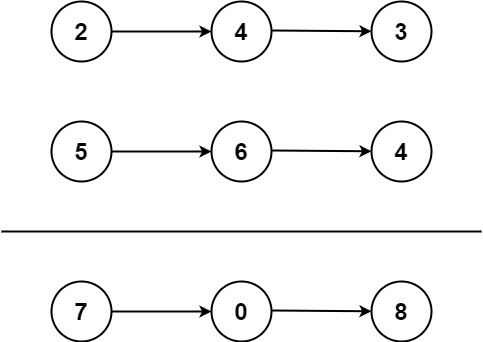20 Dec 2. Add Two Numbers
You are given two non-empty linked lists representing two non-negative integers. The digits are stored in reverse order, and each of their nodes contains a single digit. Add the two numbers and return the sum as a linked list.
You may assume the two numbers do not contain any leading zero, except the number 0 itself.
Example 1:

Input: l1 = [2,4,3], l2 = [5,6,4] Output: [7,0,8] Explanation: 342 + 465 = 807.
Example 2:
Input: l1 = [0], l2 = [0] Output: [0]
Example 3:
Input: l1 = [9,9,9,9,9,9,9], l2 = [9,9,9,9] Output: [8,9,9,9,0,0,0,1]
Constraints:
- The number of nodes in each linked list is in the range
[1, 100]. 0 <= Node.val <= 9- It is guaranteed that the list represents a number that does not have leading zeros.
- we need to deal with one situation here:
l1 1 3 1
+ + + +
l2 1 9 1
-----------------------------------------------------------------------------------
cur 2 12(we need to put 2 here) 2+carry(carry from the previous 12)
12 %10 = 2
carry = 12//10 =1 By adding a variable called carry can deal with this situation: align the addends vertically and add the columns, starting from the left-most column. If a column’s sum exceeds nine, the extra digit “carried” add into the next column.
l1 1 3 1
+ + + +
l2 1 9 1
-----------------------------------------------------------------------------------
carry 0+1+1=3 0+3+9=12 1+1+1 = 3
cur 3%10=3 12%10=2 3%10 = 3
carry 3//10 =0 12//10=1 3//10 = 0 # Definition for singly-linked list.
# class ListNode:
# def __init__(self, val=0, next=None):
# self.val = val
# self.next = next
class Solution:
def addTwoNumbers(self, l1: Optional[ListNode], l2: Optional[ListNode]) -> Optional[ListNode]:
carry = 0
result = current = ListNode(0)
while l1 or l2 or carry:
if l1:
carry = carry + l1.val
l1 = l1.next
if l2:
carry = carry +l2.val
l2 = l2.next
current.next = ListNode(carry%10)
current = current.next
carry = carry // 10
return result.next


No Comments